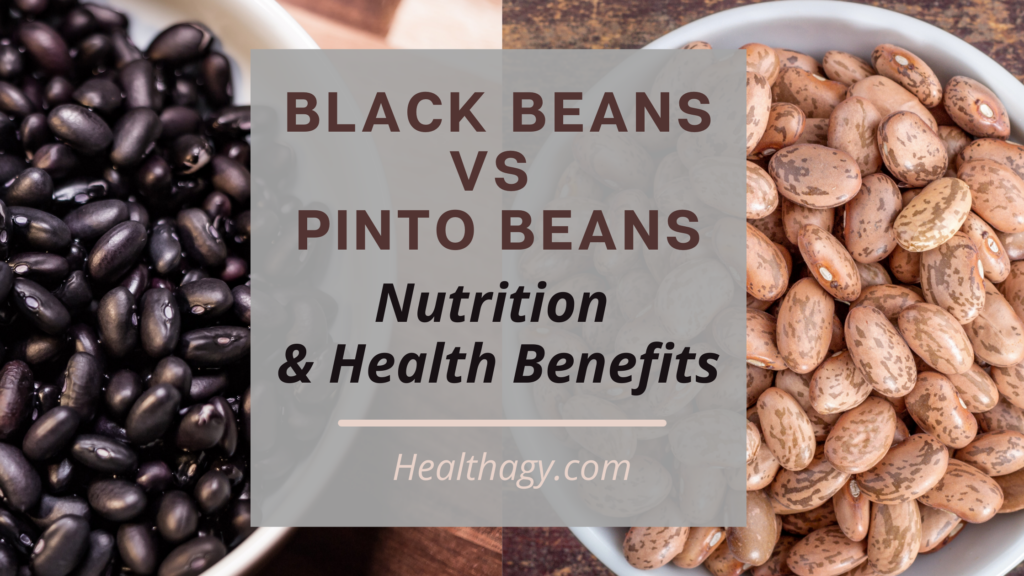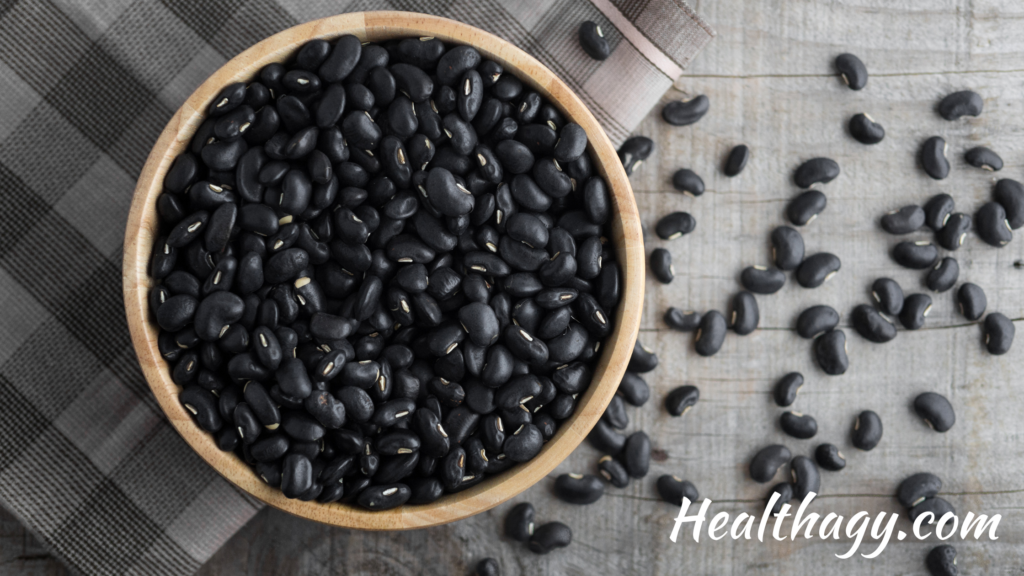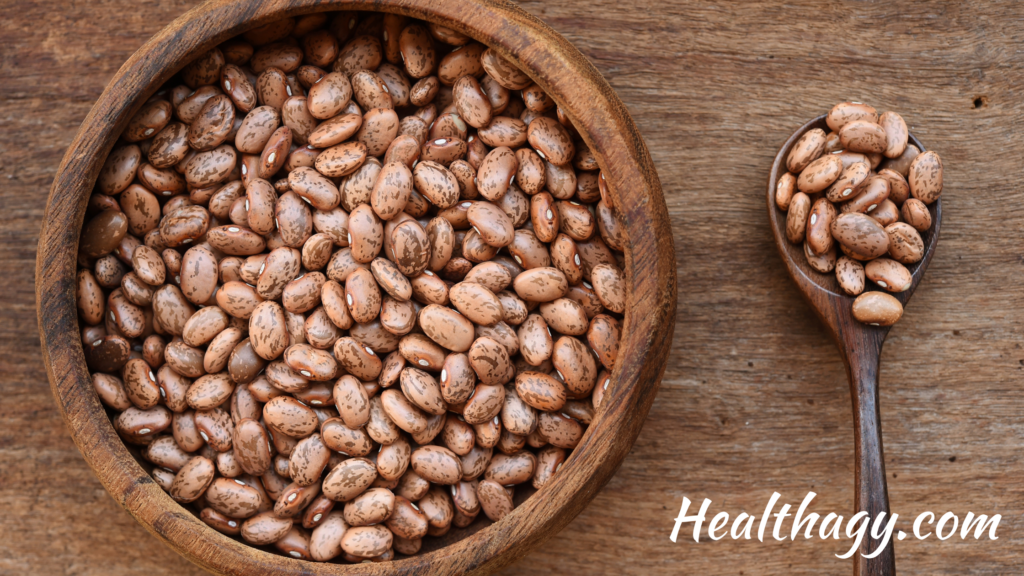
With over 400 types of beans, let’s narrow down the nutritional comparison of two of the most popular and common beans in American cuisine, black beans vs pinto beans- so you can make the best nutritional choice for your health.
In a previous post, I wrote about the differences between black beans vs pinto beans. This post will expand in more detail on the nutritional differences and health benefits between black beans and pinto beans to help you decide which type of bean is the healthiest choice for you!
Key Differences Black Beans vs Pinto Beans Nutrition
The biggest difference nutritionally between black beans and pinto beans is the slight variances they contain in vitamins and minerals. Per a one-cup serving size, black beans have slightly fewer calories, and slightly more magnesium thiamine, and zinc. While pinto beans have slightly more folate, vitamin B6 and selenium. They contain roughly the same amount of protein, fiber, and carbs.
A nutritional comparison chart covering several vitamins and minerals can be found further down in this post.

Black Beans
Black beans are legumes and also known as the black turtle bean. They originated in Central America and South America, popular in Latin American cuisine and Cajun cuisine. Black beans are commonly used in stews, soups, dips, and salads and served along with rice.

Pinto Beans
Pinto beans are part of the legume family and the most popular bean consumed in the United States. They blend easily into recipes and foods with their earthy flavor and creamy texture.
Pinto beans are commonly used in black bean soup, bean dips, vegan burger alternatives, and refried beans, a staple ingredient in traditional Mexican cuisine.
Black Beans vs Pinto Beans Nutritional Value
Nutritional value for one cup cooked black beans (172 grams) and one cup cooked pinto beans (171 g).
*Note these values could vary slightly by the brand of beans and the cooking process used.
*The % Daily Value (DV) tells you how much a nutrient in a serving of food contributes to a daily diet. 2,000 calories a day is used for general nutrition advice.
| Black Beans Nutrition | Pinto Beans Nutrition | |
| Calories | 227 | 245 |
| Fiber | 15 grams or 53% | 15.4 grams or 55% |
| Protein | 15.2 grams | 15.4 grams |
| Total Carbohydrate Dietary Fiber | 40.8g, 14% 15g, 53% | 44.8g, 15% 15.4g, 55% |
| Calcium | 46.4mg, 4% | 78.7mg, 6% |
| Copper | 40% | 42% |
| Folate (vitamin B9) | 64% | 74% |
| Iron | 20% | 20% |
| Manganese | 38% | 34% |
| Magnesium | 29% | 20% |
| Phosphorus | 19% | 20% |
| Potassium | 13% | 16% |
| Thiamine (vitamin B1) | 35% | 28% |
| Vitamin B6 | 7% | 23% |
| Vitamin C | 0% | 2% |
| Vitamin E | 10% | 11% |
| Vitamin K | 5% | 5% |
| Selenium | 4% | 19% |
| Zinc | 18% | 11% |
Vitamins, Minerals and Nutritional Benefits
Black beans and pinto beans contain various nutrients, including; antioxidants, B vitamins, folate, iron, magnesium, manganese, phosphorus, and thiamine (vitamin B1). A few of the many nutritional benefits of pinto beans and black beans are noted below.
Antioxidants: Both black beans and pinto beans are full of antioxidants. Antioxidants help protect against free radicals and fight disease. Antioxidants help support eye health and may help decrease vision loss and lower the risk for macular degeneration. One study shows that darker beans, such as black beans, contain more antioxidants than other colors of beans.
Vitamin B6: Pinto beans have significantly more vitamin B6 with 23% of the RDI (recommended daily intake) than black beans have at 7% RDI. Vitamin B6 is essential in supporting the metabolism of protein, fat, and carbohydrates in the body. It supports a healthy immune system and creates red blood cells and neurotransmitters.
Fiber: Black beans and pinto beans are high in fiber content, which may help manage cholesterol and blood sugar levels. Dietary fiber may also help support gut health and heart health.
Folate (Vitamin B9): Both Black beans and pinto beans are an excellent source of folate. Black beans contain 64% RDI, and pinto beans at a whopping 74%! Whether you choose black beans or pinto beans, you are undoubtedly on your way to meeting your daily intake of folate.
Glycemic Index: Black beans and pinto beans both rank low on the glycemic index scale. Low GI foods help stabilize blood sugar levels. Black beans and pinto beans are both considered low GI foods. Black beans have a GI of about 20, while pinto beans are about 45.
Magnesium: Black beans contain 29% of the RDI of magnesium, while pinto beans contain 20%. Magnesium is an essential mineral needed for muscle and nerve function. Magnesium also helps maintain heart rhythm, strong bones, and energy. Magnesium can also support the body in relaxing and promote a better quality of sleep.
Protein: Black beans and pinto beans are both a great source of protein. Pinto beans have just barely more protein than black beans, with pinto beans containing 15.4 grams of protein and black beans containing 15.2 grams of protein per cup.
However, beans are not a complete protein source, which is particularly important if you are on a vegan diet or want to have beans as a primary source of protein in a meal. Beans are commonly paired with rice because together, they form a complete source of protein. Brown and white rice are low in lysine but high in methionine. Beans are high in lysine but low in methionine. By combining beans and rice, you can get enough lysine and methionine along with the seven other essential amino acids, making a complete protein.
Health Benefits of Black Beans and Pinto Beans
Black beans and pinto beans both hold many health benefits, all the more reason to eat these beans up!
Bone Health: Pinto beans and black beans are great sources of iron, phosphorus, calcium, magnesium, manganese, copper, and zinc, all of which support the building and maintaining of bone structure.
Blood Pressure: The antioxidants, folate, and magnesium found in black beans and pinto beans can help lower blood pressure and support heart health.
Gut Health: As a rich source of dietary fiber, black beans and pinto beans can help support a healthy gut by promoting regularity and preventing constipation. They may also help feed beneficial bacteria in the colon.
Heart Health: Black beans and pinto beans are excellent for heart health. They can help support lowering blood pressure and help reduce the total amount of cholesterol and levels of “bad” cholesterol in your blood, decreasing risk factors for heart disease.
Healthy Weight: Black beans and pinto beans are both high in dietary fiber. Dietary fiber has been shown to help support weight loss or maintaining a healthy weight by allowing you to feel fuller longer and curbing cravings.
Key Takeaways
Whether you choose black beans or pinto beans for your next meal or another popular bean such as great northern beans or white beans- you are sure to benefit from all the great nutritional and health benefits beans have to offer.
More Beans, Please!
Karla Kueber is a Certified Evidence Based EFT Practioner and Health Coach, with a double Masters Degree in Education. She works with people to overcome emotional eating, curb cravings, and overcome resistance to eating new healthy foods. You can learn more about coaching with her here.